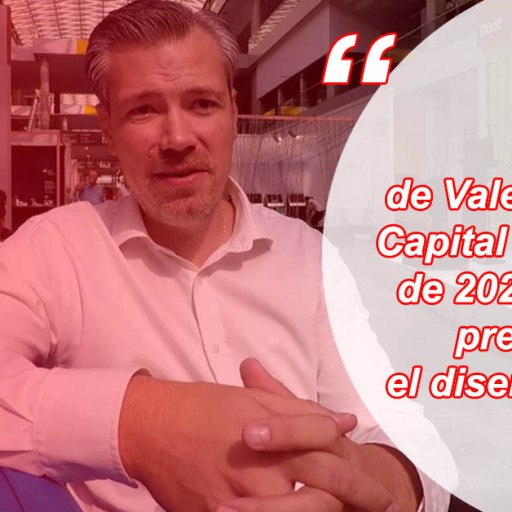According to a survey by Booking in their 2024 Travel Predictions, 55% of tourists prefer sustainable accommodations. The social protests that took place in the first months of 2024, especially in the Canary Islands, also support the need to adapt the tourism model towards practices that are more respectful of the environment and the local population.
Although hotels only generate 2% of the global CO2 emissions from the tourism industry, their carbon footprint remains significant. The key is to promote the construction of more sustainable accommodations and an ecosystem around them based on the circular economy. We will analyze good practices and examples in this report.

The hospitality industry’s commitment to the environment: Who regulates it?
Driven by the growing environmental awareness of travelers and the need to reduce the impact of their operations, hotels face a series of regulations and standards aimed at promoting more environmentally friendly practices.
In this context, the European Union is pushing for strict sustainability legislation that requires hotels to adopt more environmentally friendly practices. European regulations are stricter compared to other regions of the world, and they are becoming a competitive advantage for the hospitality sector in the continent.
So how does this translate to each hotel? In the case of Spain, while the hotel sector is included in various mentions and commitments of the Climate Change and Energy Transition Law, there is no regulatory body as such. Therefore, it is up to the companies themselves to adapt to these legal requirements to comply with the regulations.
Sustainable tourism certifications
This is where quality labels or standards come into play, serving as a guide for tourists to assess the genuine commitment. Environmental activist and expert on sustainable regulations Alberto Vizcaíno, author of the book But… Is it fixable?, explains that the most significant label is the Ecolabel or European Ecological Label, which regulates various standards for different sectors, including hotels, where it lists establishments that have earned the label.
“It is one of the few distinctions that is not greenwashing, as its requirements are public and published in the Official Journal of the European Union. They are also approved following participation from all involved parties and through a public legislative process”, he notes.
Additionally, other sustainability labels that a hotel in Spain can apply for include:
- LEED (Leadership in Energy and Environmental Design) certifies sustainable buildings awarded by the U.S. Green Building Council, based on energy efficiency, use of sustainable materials, indoor air quality, water and waste management, and sustainable design.
- BREEAM (Building Research Establishment Environmental Assessment Method) assesses buildings environmentally to certify their sustainability in design, construction, and operation, considering energy, health and well-being, management, materials, land use and ecology, transport, waste, water, and innovation.
- ISO 14001 certification is an international standard specifying the requirements for an effective environmental management system, helping organizations improve their environmental performance through environmental management, legal compliance, environmental objectives, continuous improvement, operational control, and internal audits.
- Biosphere is an international certification awarded by the Responsible Tourism Institute that promotes sustainable practices in tourism, aligned with the UN’s SDGs, focusing on sustainable management, local economic and social development, cultural heritage conservation, environmental protection, and education and awareness.
The Canarian Hospitality hotel group, for example, operates under a franchise of eight hotels in the Canary Islands and is betting on the latter label. Its CEO and co-founder, Francisco Fernández, notes that two of their establishments are already recognized, and they hope to certify the rest over time. The most representative case is the MYND Adeje, with a powerful photovoltaic installation. Fernández points out that “as in other sectors, it is the official sustainability certifications” that ultimately recognize an establishment, even though they already have chains and systems internally committed to sustainability.
He also emphasizes that more and more people are valuing sustainability when choosing a hotel. “They express it explicitly in their direct comments, in the reviews they write on opinion portals, and in their comments on social networks. It is a growing trend, especially among younger generations, and although not everyone has this perspective, there is clearly increasing sensitivity regarding sustainability and the ethics of companies working in the tourism sector,” he comments.
But, as is often the case, there is also a downside, and the sector is not free from the so-called greenwashing; that is, using supposedly green criteria without being genuinely authentic. Bearing this in mind… What real actions are hotels already taking that travelers can consider?
Actions hotels are taking to be more sustainable
Considered the most sustainable hotel in the world by travel giant Expedia, Sandos Hotels & Resorts in Cancun, Mexico, has implemented a wide range of sustainable practices such as sea turtle conservation, reducing plastic use, and reforestation programs in rural areas.
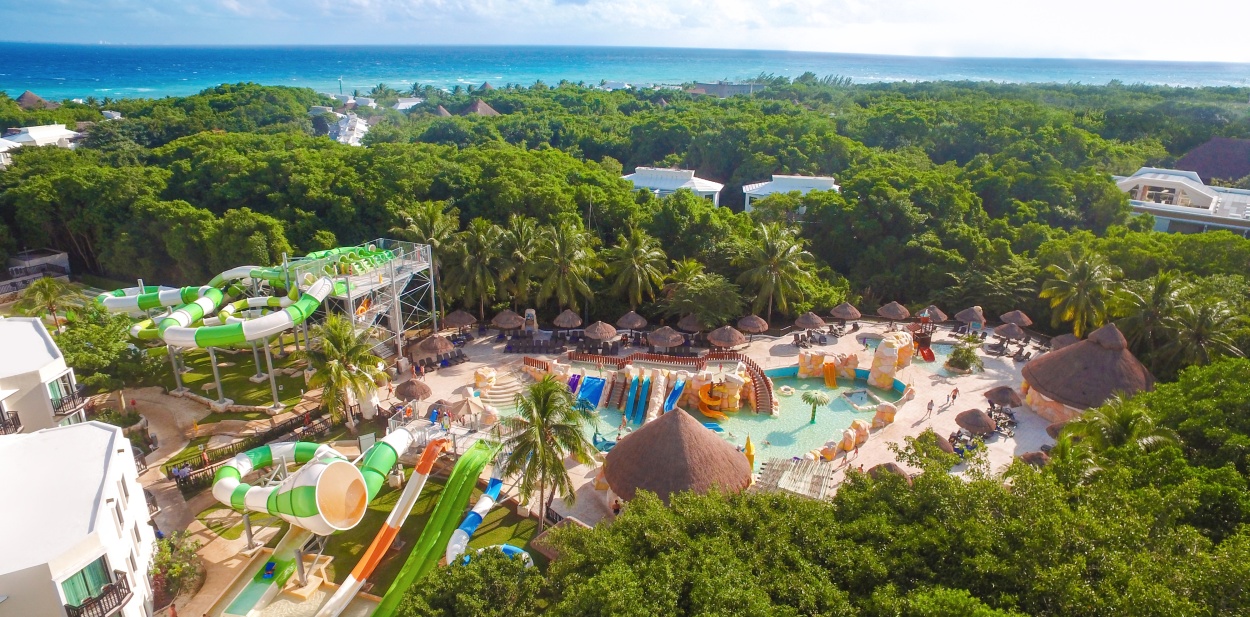
In Spain, the ILUNION hotel chain avoids food waste by making surplus food available at reduced prices through the Too Good To Go app. Additionally, through an innovative technique, it uses textile waste from its hotels to develop cutting-edge furniture.
The Barceló Hotel Group, also from Spain, has launched the Barceló Responsible program, integrating sustainability into all its operations. One of its most creative initiatives promotes short showers with a musical playlist on Spotify to save water. The playlist contains songs that do not exceed five minutes in length and serves as a reference for the shower.
The Suites Nature project in Galicia, which we’ve talked about here, is another nearby case. In partnership with the Galician forestry industry, it uses environmental adaptation criteria in its architecture and construction through wood, which acts as a CO2 sink throughout its life cycle. The facilities use renewable energy, have water-saving systems, and transform waste into raw materials.
Traveling to the Balearic Islands, we find the example of Six Senses Ibiza. It is the first resort in the Balearic Islands to obtain BREEAM certification thanks to its sustainable design and construction, which includes the use of solar energy and advanced water collection and reuse systems. In the resort’s restaurants, most dishes are made with natural products from their farm and gardens.
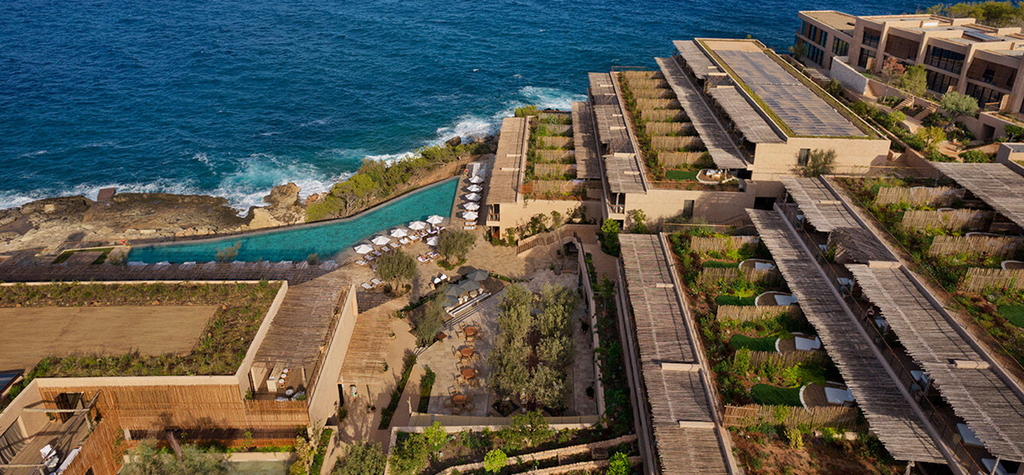
Sustainability also opens new business opportunities
Sustainability in the tourism sector has led to a new generation of accommodations that seek to integrate harmoniously with the natural environment. We highlight three examples that demonstrate that it is possible to develop tourism projects that prioritize conservation and environmental care.
Kampaoh
Sustainable campsites, present in Spain, France, Portugal, and Italy, offer an accommodation experience in the midst of nature, in protected and regulated areas, with the amenities of a hotel.
The tents, handcrafted in Seville, use wood sourced from Galicia, certified by the Rainforest Alliance, meaning it has zero impact on deforestation.
To respect the environment where the campsites are located, at the end of each holiday season, they return to their natural state.
They constantly work on innovations to improve energy efficiency, aiming to have minimal impact on the habitat where their tents are set up.
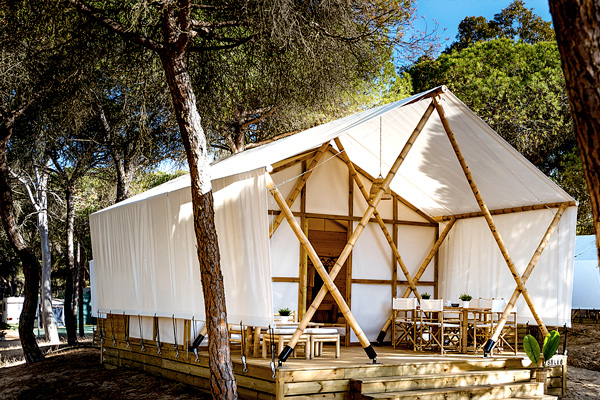
Vemdalen Villas
In northern Sweden, with views of a valley and surrounded by a pristine natural environment, the complex of 38 semi-detached holiday homes in Vemdalen coexists harmoniously with the environment.
The design of the homes respects and adapts to the surroundings, without altering the beauty of the landscape around them. Built from prefabricated wooden frames and with large windows to take advantage of natural light, they feature small common areas and outdoor trails where guests can interact.
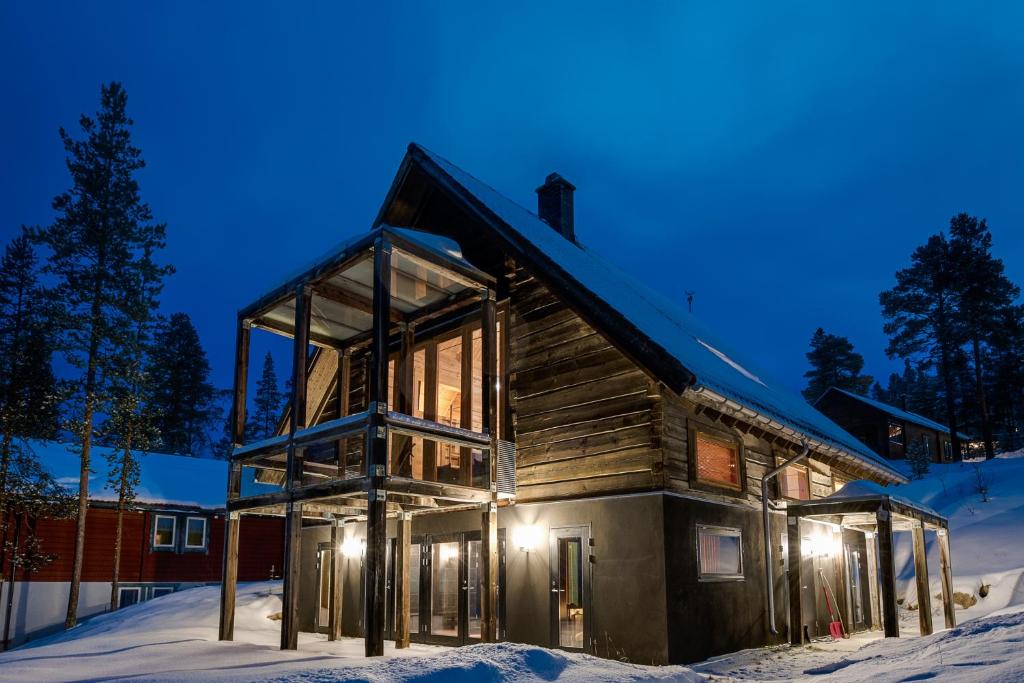
Talaia Plaza Ecoresort Begur
Located on the Costa Brava, surrounded by a pine forest near the crystal-clear waters of Sa Riera cove, it is the first hotel in Spain to obtain the sustainable Beyond Green certification.
Its firm commitment to reducing the carbon footprint means working with the community and its local producers. It uses renewable energy and efficiently manages water, in addition to eliminating single-use plastics and paper. They also organize activities for ecological awareness, such as tree planting, beach clean-ups, or “green routes” where the native flora and fauna coexist.
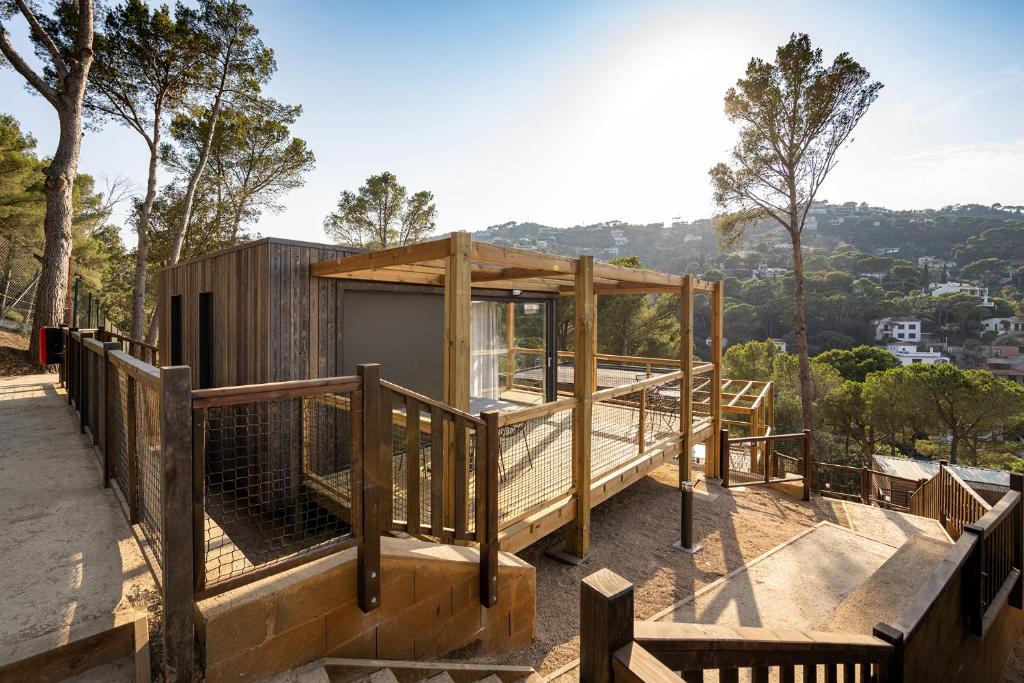
The future of hospitality will be green, or it won’t be (and regulations agree)
As we can see, the hospitality industry faces an urgent challenge to assume greater environmental responsibility and contribute to building a more sustainable future. In this scenario, European regulations play a key role in promoting the adoption of more environmentally friendly practices, including requirements for energy efficiency, environmental and social responsibility, and waste management.
The goal of the European Commission’s Green Deal is to have net zero greenhouse gas emissions by 2050, with a 55% reduction by 2030.
This legislation affects companies in all sectors, including hospitality, and aims to promote sustainability and the ecological transition.
Initiatives like Booking Holdings, which aims to achieve a net-zero target by 2040, incentivize the hospitality industry to reduce its share of the 2% of global CO2 emissions.
As environmental awareness continues to grow, it is expected that more and more establishments will join this movement towards greener tourism, thus contributing to the construction of a more sustainable future for all.



